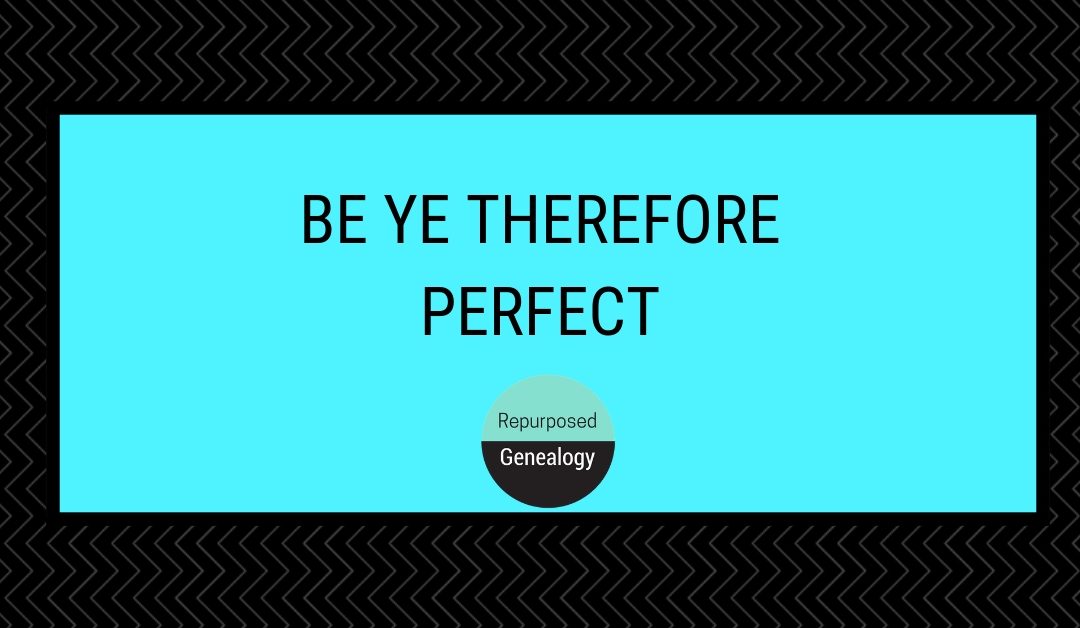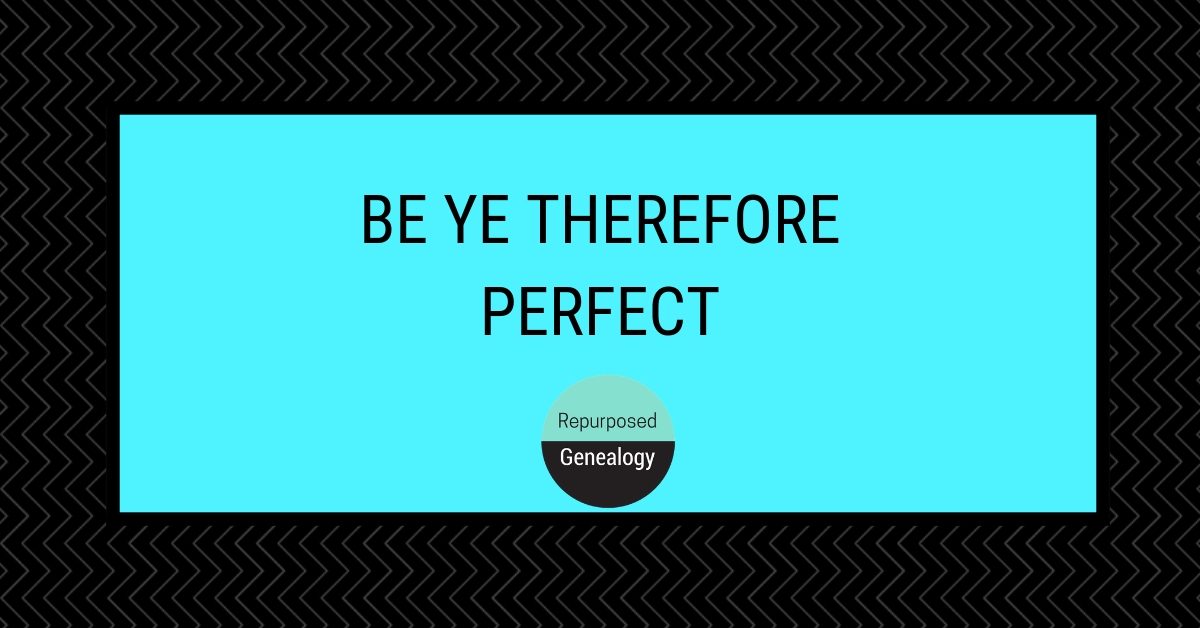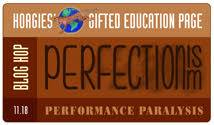Be ye therefore perfect, even as you Father, which is in heaven is perfect
Matthew 5:48
I don’t know when the first time was that I heard that scripture in a talk or lesson in church as a child, but I remember how it made me feel. I felt discouraged and inadequate. I wanted to give up without even trying to be perfect like God. I had already been trying to be perfect at so many other things and failing miserably.
It is easy for me, as a gifted person, to get stuck with a fixed mindset. I want to be the best at everything. I am used to being better than average at most things, and I have a difficult time not beating myself up when I don’t master a new skill immediately. I’ve always wanted to be perfect.
But, I’m not perfect, and it really bothers me.
I repeat the mantras to myself often, but I’m still working on believing them 100%. “I’m not perfect, and that’s okay. I’m allowed and expected to make mistakes, that’s how I grow.”
I can hear my inner critic cackling. It’s hard to ignore her too, because she’s pretty loud.
I thrive on tangible metrics. They also feed my perfectionism.
As a child, I wanted to be a perfect student, and know all the right answers. Straight A’s could prove that I had perfectly mastered the material. 100% is a perfect score. I was ashamed to earn less than an A.A perfect student should get A’s.
As a teenager, when I competed in DECA, I wanted to win first place. I wanted to be the best. First place is perfection. Winners should be perfect. Second place is the first loser.
At 25, I wanted to be the perfect Starbucks store manager. I wanted 100% mystery shops, the highest reviews from team members and customers, and the most profitability in our area. A perfect manager should be awarded manager of the quarter. I wasn’t a perfect manager.
At 30, after struggling with infertility and giving birth to triplets. I wanted to be the perfect mother.
A perfect mother should… (fill in the blank with some preposterous expectations heaped upon you by others and yourself. )
There are so many shoulds.
That’s when the weight of my perfectionism consumed me. Be ye therefore perfect. Maybe, I should be perfect, but I’m totally not. 11+ years and 4 brilliant boys later, and I don’t know that I have mastered one specific part of parenting, let alone perfection.
My boys had ice cream for dinner this week… twice. One of my boys, who shall not be named in this post, didn’t shower for 6 days straight last week. I was too tired to argue with him.
Maybe you struggle with not being a perfect parent also. It’s probably in a different way than I do. That’s what makes it challenging.
I’m looking at you with your organic, lovingly crafted meals, and well groomed children. You’re perfect.
And you’re looking at me as this spontaneous, free-range parent… At least I hope you are. Spontaneous is better than scatter-brained, and free-range is better than frazzled.
True story.
I’m finally recognizing that it’s okay that we’re not perfect people or parents. What I didn’t understand or know until recently, is that be ye therefore perfect doesn’t mean without fault or error. The Greek for perfect in that scripture apparently translates closer to whole or complete.
So, the next time someone compliments you on your “perfect” gifted child or your “perfect” parenting skills, smile and say thanks. You are doing a better job that you’re probably giving yourself credit for. Our lives as parents are messy. Sometimes, it’s even a hot mess. The messy parts of our lives make them whole or complete. The messy parts are perfect.
The messy parts of our lives make them whole or complete. The messy parts are perfect. Click To Tweet
This post is part of Hoagies’ Gifted Education monthly blog hop on perfectionism. You can read more about it from my brilliant friends by clicking here or on the graphic below.




Perfect, Jenn ❌❌
This. I needed this.
Jen, I am sooooo happy to see you back online. As for perfect, this year has taught me a lot about that! I had to give up, too. While we had two wonderful family reunions, one at grandson’s graduation from nursing school in June with our immediate family, another in July with the ENTIRE family, some 40#strong, I kept trying to make things work. And then our PC died and I had to find another, on sale, yes, but so advanced I had to have our 30 yr. old asst. pastor come help me. And then we had to have our entire 1924 built house rewired! Mercy. However. We are slowly returning to what passes for normal. I still have to get my writing room cleaned out (we were running a heavy duty electrical cord from the one outlet that worked up the stairs to husband’s C-Pap at night and to the office in the day. All the while navigating everything at night with flashlights and electric lanterns.) My workout regimen has gone…well, somewhere; my fingernails are all broken and weak; and bruises on my arms are beginning to heal. My head? I’m still working on that.
So I send you a hug and good wishes for not being perfect. It seems a lost cause at this point!
Love, Janet
PS: I absolutely loved the line about your son going six days without a shower!! Boys. But at least they make us laugh from time to time.
Janet! Good to connect again. Rewiring your farm house would certainly be quite a project. We moved from our 2 bedroom townhouse in May into a little rental rambler home 27 minutes from town. The townhouse is almost done being remodeled so we can sell it. It amazes me how projects always end up costing more than we expect them to. I’m snuggled under the electric blanket already. It snowed here for the first time last week. It usually does at least once before Halloween to remind everyone to get ready for winter. It will be interesting to see if this house is any warmer in the winter. It has electric heat, so I will see how it goes in the winter time when we get that first big power bill. Hopefully, the new computer will have bells and whistles and make your life easier!
Feeling grateful for God’s tender mercies. The struggles, the messes and imperfections help me appreciate the good so much more. I can finally see and write again. Plus, I had lasik, so I don’t need glasses anymore!
So true! We think others have it together and are hyper-aware of how we don’t measure up to the “them” we’ve created in our minds. 🙂
My kids sometimes go six days between showers – I call it being environmentally conscious! 😉
Yes! Compliments about perfection certainly backfire. It is so important to appreciate the “messy” part instead.
A client of mine said she strives for wholeness, not perfection. Sounds good to me!
The desire for perfection is something I put a lot of energy into until I damn near had a breakdown and my therapist told me I could be perfect or well. In fact, I had to mantra that and sometimes, nearly ten years later, I still do. “Perfect or well” like scales on a balance.
I’ve come to GREATLY value authenticity and wabi-sabi and I do believe failing to be perfect, to not do things perfectly, has made me a more compassionate person. Sometimes I watch women trying to be perfect, fretting over doing things perfectly, and I say to them what I say to myself, “It’s good enough. You’re good enough.”
Great to read you again 🙂
Joey! I’ve missed you! The more I do the more I realize that I can’t do it all. It’s just not possible… let alone doing it perfectly. In years past, I sewed matching theme Halloween costumes for our family. This year, I bought the 1 kid who still trick or treats a costume from Costco. The sick triplets snuggled with me on the couch. We watched So I married an Ax murderer. I fell asleep 20 minutes into the show. It was perfect.
Oh so true! It’s all the messy parts of vacations that we talk about first when reminiscing and the meals that didn’t turn out quite right are the ones we remember. “The messy parts of our lives make them whole or complete.” Love it. Thank you.